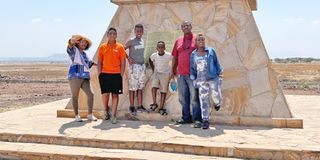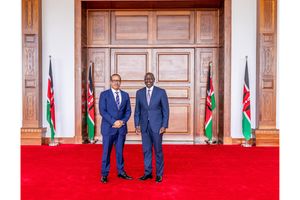US-based Emil Muta explores Tanzanian diaspora’s complex ties with homeland

Emil Muta and his family. He maintains that his nationality remains Tanzanian and that his American citizenship was granted after fulfilling the necessary criteria. PHOTO | COURTESY
What you need to know:
- Emil, a former Tanzanian government employee with 12 years of service in the immigration department, immigrated to the United States over two decades ago in pursuit of better opportunities as a student.
Born in a village in the Karagwe District of the Kagera Region, Emil Muta Augustine identifies primarily with his roots as a Haya and as a proud Tanzanian.
In his villa located in the suburbs of Seattle, Washington State, he continues to embrace the traditions and cultural practices instilled in him during his childhood in Kagera, passing down these cherished values to his children.
As the year draws to a close, he eagerly anticipates the arrival of senene. These edible bush crickets, scientifically known as Ruspolia differens, are a beloved delicacy in the Kagera Region, as well as in parts of Uganda and Kenya.
Renowned for their high protein content, senene are typically harvested during the rainy season, adding a cherished seasonal flavor to the local cuisine.
Initially, his American-born children found their father’s enthusiasm for the insects arriving from Tanzania somewhat peculiar.
However, as time went on, they grew accustomed to the unique cuisine and eventually embraced it, enjoying their fair share of the senene harvested from Kagera.
Emil, a former Tanzanian government employee with 12 years of service in the immigration department, immigrated to the United States over two decades ago in pursuit of better opportunities as a student.
As one of the earliest Tanzanians to settle in Seattle, he has played a pivotal role in establishing the Tanzanian community there, earning him the affectionate nickname “Baba wa Seattle,” which means “Father of Seattle.”
Immersed in a different culture and way of life, Emil was astonished to see snow, and during fall he was taken aback upon seeing trees shed all their leaves, something he had never seen before at home.
Upon settling down in the US, he started helping his wife and parents who were back home.
As his financial situation improved, he began investing in Tanzania by constructing residential houses. Together with friends, he also co-founded the Tanzania Diaspora Hub (TDH), an initiative aimed at investing in various sectors back home in Tanzania.
“So far we have invested in fish farming, cashew nut, and avocado farming,” he stated. He saw that as an opportunity to connect the Tanzanian diaspora with the homeland. A true Karagwe son of the soil, he never forgot his home. He persuaded the Rotary Club, a global organization dedicated to community services with offices in Tanzania to embark on a malaria eradication initiative in Karagwe.
He was committed to ensuring that no women, children, or elderly individuals in his village succumbed to malaria. His efforts included fumigating potential mosquito breeding grounds, streets, and homes, as well as distributing free mosquito nets to the community.
Mr Muta has witnessed first-hand how countries such as China, Germany, and even Rwanda have effectively leveraged their diaspora in America to acquire technology that propels their domestic advancements, particularly in sectors like automobile manufacturing. He hopes that Tanzania will utilize its diaspora to do the same.
He said that many Tanzanians who go to study in the US do not take back their new-found knowledge back home. He hopes a closer collaboration between the government and the diaspora will be fostered so that the country can effectively identify what experience and knowledge is required and how the diaspora who possess such expertise can take part in advancing the country’s technological expanse.
“Rwanda has achieved remarkable success. They successfully imported drone technology, and with the support of their diaspora, developed the first blood-delivery drones to transport vital supplies to remote hospitals that are difficult to access,” he stated.
However, he noted that Tanzanian diaspora are hindered by the challenges they encounter upon acquiring other nationalities. With over a decade of experience in the immigration department, Muta is keenly aware of the dilemmas many Tanzanians abroad face.
He explains that there is a fundamental distinction between citizenship and nationality. Nationality is determined by the country of birth, while citizenship can be acquired through naturalization.
He firmly asserts that his American citizenship was granted after fulfilling the necessary criteria; however, he maintains that his nationality remains Tanzanian.
His lineage can be traced back to Karagwe in the Kagera region, and he believes that acquiring foreign citizenship does not equate to renouncing his tribal identity.
“I cannot reject my tribe; I can’t deny where I come from,” he affirmed. In a gesture to preserve their Tanzanian heritage, he has bestowed traditional names upon his American-born children. One is named ‘Mganyizi,’ while the others are called ‘Mchunguzi’ and ‘Mgisha.’
Through this naming practice, he aims to instill a sense of Tanzanian identity in them, ensuring that, even after his passing, they can return to Karagwe in Kagera and be embraced as part of their ancestral community.
For many years, following the enactment of the Tanzania Citizenship Act of 1995, numerous Tanzanians living abroad have fervently sought recognition from their government.
Recently, there have been whispers and aspirations regarding the potential introduction of a ‘special status’ for these diaspora; however, these hopes have yet to come to fruition.
This situation has prevented many members of the diaspora from fully committing to investing and engaging in Tanzania, as they increasingly perceive themselves as foreigners—outsiders looking in. Mr Mutta expresses a desire for them to be granted dual citizenship rather than merely a special status.
“In my tradition as a Mnyamba Mhima, if my children are granted half-citizenship in the form of special status, they will not be recognized in my village, nor will they be eligible for chiefdom,” he elaborated.
He noted that the term “diaspora” carries a negative connotation among ordinary Tanzanians. He hopes they will instead be referred to as “Tanzanians living abroad,” which would help fellow citizens view them not as outsiders but as integral members of the nation.
“I hope Tanzanians will become well-informed about us living abroad, understand why we are part of Tanzania, and recognize our importance to our country,” he stated.
“They are attempting to divide us and create animosity between us, but we are kin. No matter where we reside, we are Tanzanians,” he added.
The Tanzanian diaspora community continues to grow; these compatriots, who have left their families, friends, and familiar lifestyles in search of better opportunities abroad, play a significant role in stimulating the economy through remittances. In 2023, it was reported that diaspora remittances totalled more than $400 million.
This substantial sum is directed to their families, real estate, farming, and various investments back home, creating employment and generating tax revenue.
However, the reluctance to fully embrace them as sons and daughters of the soil remains.
He insists that Tanzania is like his mother, emphasizing that no matter the circumstances, he cannot harbor resentment towards her. “Tanzania is beautiful, and there is no other mother like her,” he remarked.
He and his family support and respect the government and are committed to working together to develop Tanzania in unity.
Muta has preserved his traditions and way of life; he remains in contact with friends from his time in immigration, contributing to funerals and weddings back home, as is customary for many Tanzanians.
His cuisine features bananas and Ugali, a Tanzanian delicacy that he has taught his children to appreciate.
Additionally, the Tanzanian community has groups of soccer fans supporting the two biggest teams in the country, Simba and Yanga.
Muta has not lost hope for the dream of dual citizenship, even if it may not materialize in his lifetime. He wishes for his children to witness this change: “It will take time; it might be delayed, but it will happen,” he affirmed.
“At the end of the day, I will be buried in the same village where my father and grandfather were laid to rest,” he concluded.




